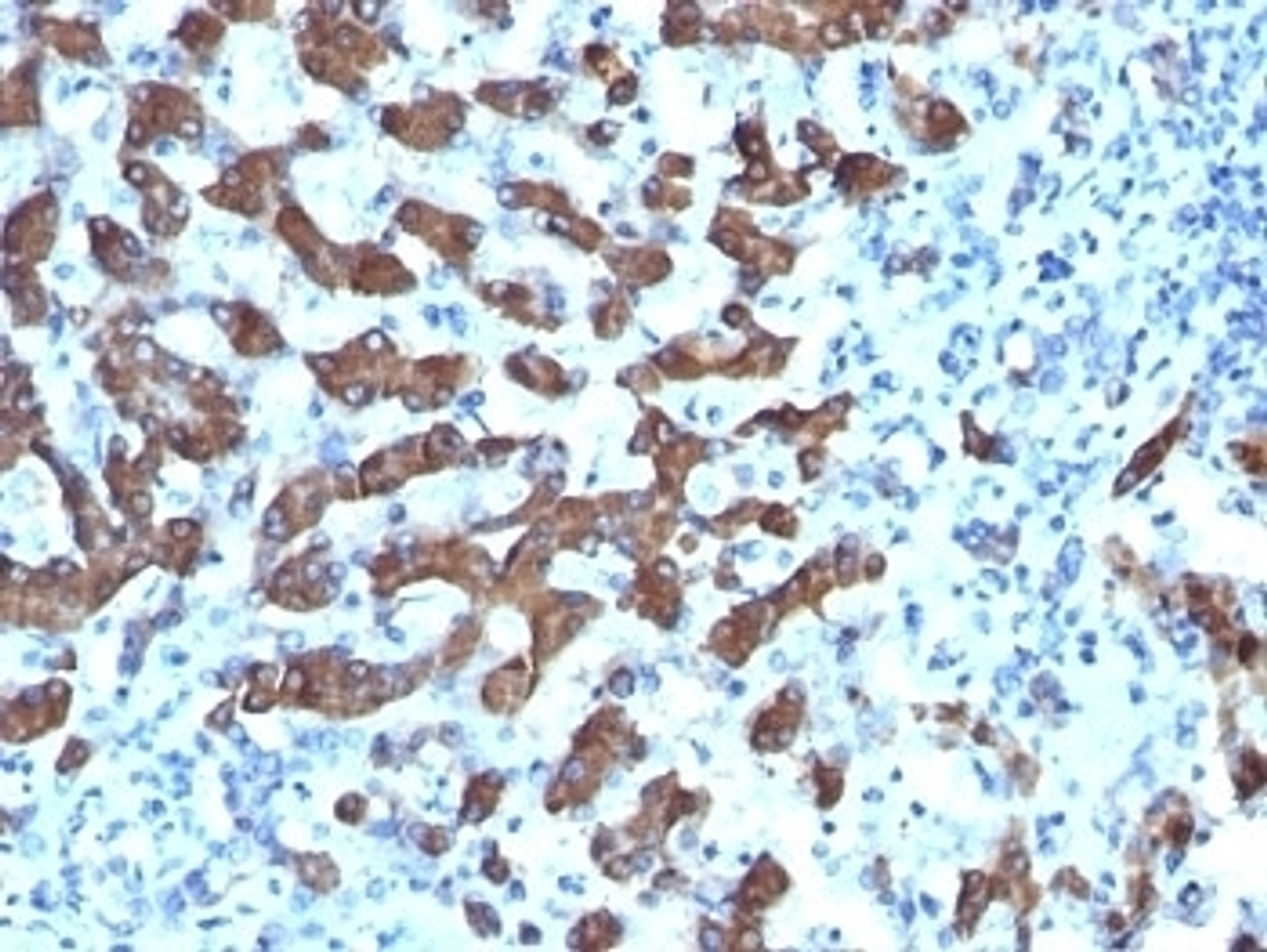Product Description
CPS1 Antibody [CPS1/1022] | 33-337 | ProSci
Host: Mouse
Reactivity: Human, Dog
Homology: N/A
Immunogen: Recombinant human protein was used as the immunogen for the CPS1 antibody.
Research Area: Obesity, Signal Transduction
Tested Application: IF, IHC-P
Application: Immunofluorescence: 0.5-1 ug/ml
Immunohistochemistry (FFPE) : 0.25-0.5 ug/ml for 30 min at RT (1)
Prediluted format : incubate for 30 min at RT (2)
Optimal dilution of the CPS1 antibody should be determined by the researcher.
1.Staining of formalin-fixed tissues requires boiling tissue sections in 10mM Tris with 1mM EDTA, pH 9.0, for 10-20 min followed by cooling at RT for 20 min
2. The prediluted format is supplied in a dropper bottle and is optimized for use in IHC. After epitope retrieval step (if required) , drip mAb solution onto the tissue section and incubate at RT for 30 min.
Specificiy: N/A
Positive Control 1: N/A
Positive Control 2: N/A
Positive Control 3: N/A
Positive Control 4: N/A
Positive Control 5: N/A
Positive Control 6: N/A
Molecular Weight: N/A
Validation: N/A
Isoform: N/A
Purification: Protein G affinity chromatography
Clonality: Monoclonal
Clone: CPS1/1022
Isotype: IgG1
Conjugate: Unconjugated
Physical State: Liquid
Buffer: PBS with 0.1 mg/ml BSA and 0.05% sodium azide
Concentration: 0.2 mg/mL
Storage Condition: Aliquot and Store at 2-8˚C. Avoid freez-thaw cycles.
Alternate Name: Carbamoyl-phosphate synthase [ammonia], mitochondrial, Carbamoyl-phosphate synthetase I, CPSase I, CPS1
User Note: Optimal dilutions for each application to be determined by the researcher
BACKGROUND: This mAb recognizes a protein of 165kDa, identified as carbamoyl phosphate synthetase 1 (CPS1) . This mitochondrial enzyme catalyzes synthesis of carbamoyl phosphate from ammonia and bicarbonate. This reaction is the first committed step of the urea cycle, which is important in the removal of excess urea from cells. Deficiency of CPS1 is an autosomal recessive disorder that causes hyperammonemia. CPS1 is a hepatocyte specific protein that localizes to the mitochondria of hepatocytes. It is a sensitive marker for distinguishing hepatocellular carcinomas (HCC) from other metastatic carcinomas as well as cholangio-carcinomas. HCC s occur primarily in the stomach, but they are also found in many other organs. CPS1 may also be a useful marker for intestinal metaplasia. Reportedly, strong expression of CPS1 correlates with smaller tumor size and longer patient survival. Occasionally, CPS1 is also found in gastric carcinomas as well as in a few other non-hepatic tumors.
 Euro
Euro
 USD
USD
 British Pound
British Pound
 NULL
NULL

![CPS1 Antibody [CPS1/1022] CPS1 Antibody [CPS1/1022]](https://cdn11.bigcommerce.com/s-452hpg8iuh/images/stencil/1280x1280/products/575193/811598/porsci_lo__79508.1648973713__66384.1649091853.png?c=2)

![CPS1 Antibody [CPS1/1022] CPS1 Antibody [CPS1/1022]](https://cdn11.bigcommerce.com/s-452hpg8iuh/images/stencil/100x100/products/575193/811598/porsci_lo__79508.1648973713__66384.1649091853.png?c=2)

![CPS1 Antibody [CPS1/1022] CPS1 Antibody [CPS1/1022]](https://cdn11.bigcommerce.com/s-452hpg8iuh/images/stencil/500x659/products/575193/811598/porsci_lo__79508.1648973713__66384.1649091853.png?c=2)

![CPS1 Antibody [SPM615] CPS1 Antibody [SPM615]](https://cdn11.bigcommerce.com/s-452hpg8iuh/images/stencil/500x659/products/575194/811600/porsci_lo__79508.1648973713__56932.1649091853.png?c=2)






